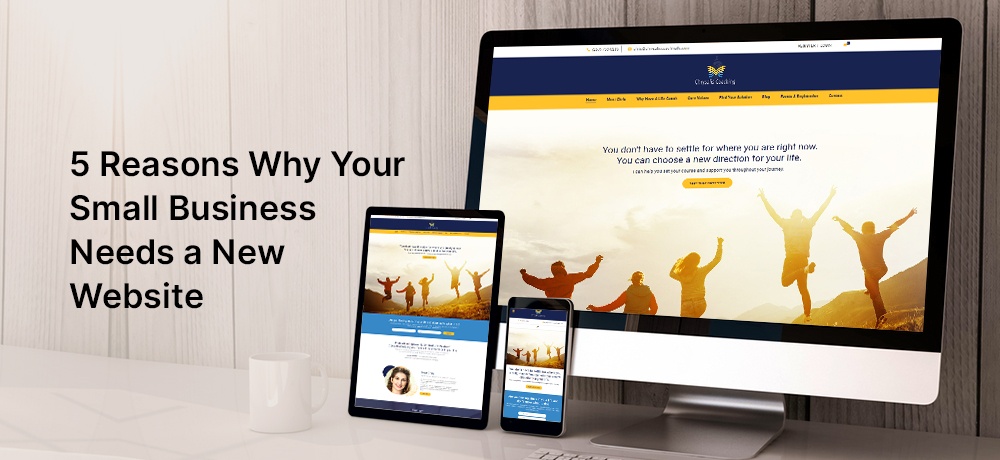5 Reasons Why Your Small Business Needs a New Website
As a small business owner, having a website is crucial to your success in today's digital age. If you don't already have a website, or if your current website is outdated or hard to use, it's time to consider investing in a new one. Here are 5 reasons why your small business needs a new website:
-
Reach a wider audience: With a website, you can easily share information about your products and services with potential customers from all over the world. This can help you expand your customer base and increase sales.
-
Improve your credibility: A professional-looking website can establish your business as an expert in your field, which can help you attract more customers and build trust with potential clients.
-
Save time and money: A website can streamline your customer service process by allowing customers to find answers to common questions on their own. This can save you time and money, so you can focus on running your business.
-
Stay competitive: In today's market, having a website is increasingly important for small businesses. Without a website, you may be at a disadvantage compared to your competitors.
-
Gain valuable insights: A website with built-in analytics can provide valuable data about your visitors, such as where they are coming from, how long they stay on your site, and what pages they visit. This data can help you understand your audience better and make informed decisions about how to improve your website and marketing efforts.
In conclusion, a new website is a crucial investment for any small business looking to stay competitive in today's digital age. With a new website, you can reach a wider audience, improve your credibility, save time and money, and gain valuable insights about your customers. Don't let your small business fall behind, take the first step towards a modern and effective website today by scheduling a demo with Webware. Our team of experts will work with you to understand your business needs and create a website that will help you reach your goals. Don't wait, schedule a demo with Webware today and take your small business to the next level!
Digital Marketing Trends for 2023: The Rise of Video, Personalization, Influencer Marketing, and Chatbots
Digital marketing is constantly evolving, and as we move into 2023, there are several trends that small business owners should be aware of.
Video Content:
One of the biggest trends in digital marketing is the continued rise of video content. More and more businesses are using video to engage with their audience, and this trend is only set to continue in 2023. Whether it's live streaming on platforms like Facebook and Instagram, or creating engaging videos for YouTube and Vimeo, video is a powerful tool for reaching and engaging with potential customers.
Personalization:
Another trend to watch out for in 2023 is the increasing importance of personalization. As consumers become more savvy and more selective about the content they engage with, businesses will need to find ways to tailor their marketing messages to individual customers. This could involve using data and analytics to create personalized email marketing campaigns, or using AI and machine learning to personalize the customer experience on a business's website.
Influencer Marketing:
In addition, the use of influencer marketing is also set to grow in 2023. Influencer marketing involves partnering with social media influencers who have a large following in your target market and using their influence to promote your business. This can be a powerful way to reach a large audience and build trust with potential customers.
Chatbots:
Finally, the use of chatbots is also set to increase in 2023. Chatbots are AI-powered software programs that can simulate conversations with customers in real-time, providing quick and convenient answers to common questions and helping to improve the customer experience.
In summary, digital marketing in 2023 is all about video content, personalization, influencer marketing, and chatbots. Small business owners who want to stay ahead of the curve should consider incorporating these trends into their marketing strategies.
Need help with website and digital marketing for your small business? Join over 4000 business owners like you that are a part of Webware. Book a Growth Session with us and let’s look at your current efforts and if Webware is the right fit for you.
How to Respond to Negative Reviews [And Turn Tides In Your Favor]
The other day, our team was discussing the best shows ever made. We all unanimously voted for Breaking Bad. And why not? It has an IMDB rating of 9.5 for crying out loud. On Google, it is rated 4.9 with 14361 ratings. Yet, some people have given it a lower rating.
“I would rather eat my toes than watch this again,” wrote a viewer. You bet, we were equally shocked.
Moral of the story - not everyone is easy to please.
Second moral of the story – online reviews are gaining traction.
In a 2016 report from Pew Research Center, 82 percent of American adults said that they sometimes or always read online reviews when making new purchases. Over two-thirds of the regular review readers also believed these to be “generally accurate.”
We have additional data to prove the importance of reviews – both negative and positive.
- 93% of customers will read reviews of local businesses to determine its quality.
- Reviews account for about 15% of the method Google uses to rank local businesses.
- 67% of B2B buyers want to see a mix of both positive and negative reviews when checking out a business.
- Seven out of 10 consumers changed their opinion about a brand after the company replied to a review.
- 82% of customers actively seek out negative reviews.
While there are more positive reviews than negative, why do people focus on the latter?
The answer is simple. Five-star reviews can easily be faked ...and force people to look at reviews with fewer stars to get a more genuine response.
The bad news - even one negative review can impact your business for the worse and drive potential customers away. It can undo all the benefits you received from your positive reviews.
The good news – a Harvard Business Review study found that ratings increased when businesses responded to customer reviews.
This is why, apart from setting a goal to get more positive reviews, you need to know how to respond to negative reviews.
Here’s the secret sauce to help you get it right every single time.
- Think Of The People Who Will Read It
The negative reviews are often out there to be read by your potential customers. They will scrutinize each line and you will never know which line or word will influence their buying decision.
Reply in such a way that all the readers form the opinion that your firm or business is dedicated to serving customers in the best manner. Their satisfaction is your prime focus. Show that you are committed to improving their experience.
Pro tip: Before responding publicly, respond to your customers privately over an email or a call, or invite them to solve the matter in person. This increases the chance of them changing their review and rating.

- Constantly Monitor Your Reviews
Thinking of how to respond to negative reviews on Google? Do you struggle with responding to all of your negative reviews on other platforms as well? This is where Online Reputation Management tools (ORM tools) can help you.
You can use them to monitor various online platforms and respond to negative reviews quickly. This is important because customers whose complaints get handled in less than 5 minutes are likely to make a future purchase from your business. If you don't say anything or wait too long to respond, this will only annoy your customers and get them to turn away from you forever. A timely response means you care for your customers. Period.

- Keep Calm and Handle It
Regardless of the outcome, always acknowledge the problem at hand. Without this, the customer may feel like their concerns are not being recognized which can escalate the situation. The rule of the thumb is to stay positive.
Start by thanking them for bringing this issue to your attention and proceed to offer them a resolution with a sincere apology. Anyone who sees the complaint will take into account how positively you handled the situation which will go a long way to improving your company's online reputation.
Pro Tip: Make sure you have a game plan ready before responding. Keep a database of positive responses on hand for anyone to respond with on behalf of your team.

- Be Genuine to a Fault
The first step to addressing a negative review is to understand your customers' point of view by putting yourself in their shoes. Ask them the details of what went wrong and what steps you can take to avoid a similar situation in the future.
Even if the matter is trivial or it is just a misunderstanding, showing customers that you genuinely care, will help your cause in winning their confidence. Be empathetic, and find out what bothered them with clear and succinct communication. And most importantly, be professional, helpful and objective.
Pro Tip: You can also sign the reply with a name to show customers that they are talking to a real person from your company.

- Offer A Solution
This has already been covered in previous points but we are mentioning it again because it's very important. Offering customers an immediate remedy or quick solution can improve their happiness in no time at all and can help end the review thread on a positive note from the customer.
There are many ways to offer a solution based on the situation at hand. If they are unhappy with a specific person from your business, let them know you will look into the matter. If they had an issue with your product, offer them a refund or a discount on their next purchase. If they received poor customer service, offer them a sincere apology with a gift card. At the end of the day, winning back a disgruntled customer is worth more than a few dollars in the long run!

The Wrap
Trying to pretend that a negative review does not exist will do nothing but make a bad situation worse. By making sure you respond to them personally in a timely manner, there is a good chance you can save yourself from losing a valuable customer while displaying your outstanding customer service. Show people that you are a business who cares.
TLDR:
- Negative reviews are not always bad for your business.
- Responding to each negative review is important
- Keep a list of responses handy
- Be prompt, professional, and positive while responding.
- Show that you are authentic
9 signs you need help with your website
If you’re a small business owner that cares about your success, then you probably already have a website. It’s important to understand that with so much competition online, merely having a website is not enough. The key question is whether your website is actually working for your business. Furthermore, how much available time do you have to maintain your website without affecting your day-to-day operations?
If your website is not bringing in enough traffic or you spend too much time trying to figure out how you can be successful online, then you probably need some help. Here are 10 most common signs that you need help with your website:
- Your website is not mobile responsive. Even worse, you’re not sure what mobile responsiveness is. You want to make sure that your website is designed to fit all devices so you can provide a consistent user experience without sacrificing results.
80% of online users in 2019 used mobile devices when searching the internet. On top of that, if your website is not designed for mobile you will notice a big drop in your search engine rankings or might not even get ranked at all. If you’re interested in learning more about how your website’s responsiveness could be affecting your ability to be found on search engines, you should speak to an expert immediately. - You know SEO is important, but don’t know how to get it to work for you. If you don’t know how to utilize Search Engine Optimization tools, this is a sign that you need help. SEO is an essential component of a successful and effective online strategy. Search engines, like Google, run algorithms that measure a number of criteria on your website when deciding where to rank it in the search results. Some of the things that affect your SEO include keyword selection, website content, mobile-friendliness, internal & external links, search relevance, site structure, location, and the overall quality (load speed, duplicate pages, broken links, etc.).
If you can’t find your own website online, how do you expect your customers to find it? If you have trouble finding your website online, without typing in your business name, then that means there is plenty of room to optimize it. Search Engine Optimization (SEO) is an essential website practice that makes it easier for search engines, like Google, to find you. There are a number of online practices and strategies, which will affect your website’s SEO. Being able to implement and execute these practices effectively will drastically improve your ability to be found online.

- Your website has little to no traffic. If your website has very little or declining traffic, then that is a clear sign that you need to adjust your current website strategy. Even in heavily saturated industries, there are always opportunities to improve your rankings by trying out new keywords and increasing links. A little help from SEO experts can go a long way.
Sure, there are tons of places where you can go online to learn about setting up your website's SEO, but how much time do you really have to become an SEO expert? Developing a high-quality SEO strategy for your business is a complex process. You need to make sure that your content development, website design, and overall brand story work together to engage audiences. If you feel like ongoing SEO planning and maintenance is outside of your comfort, you will likely need some help. - Your website visitors are not moving past your home page. If your website has a high bounce rate, your visitors are either clicking the “back” button to leave your site, closing the tab, or going dormant. In any case, your website is not captivating them which could be due to a few things:
- The keywords your audience is searching for does not fit your content.
- Your content and messaging is confusing or difficult to understand.
- Your website is difficult to navigate.
- You do not have the right CTAs (Calls to Action)
- Your website is attracting the wrong traffic.
Whatever the reason, if your website visitors aren’t moving past the initial landing page, now is a good time for a general website review.
- Your website isn’t updated regularly. Regular updates help search engines understand that you have an active website with relevant content. If your website does not contain keyword rich content, a regularly updated blog, and consistent updates, you will likely see a decline in traffic which will affect your search engine rankings. If you’re unsure of the type of content that you need to add to your website, how to edit or add pages, or don’t even have time to manage a blog, you probably need to speak to an expert to get you on track.
- Your website has 404 error pages. You might have seen these messages in the past when you visit a link or a website page and see a message that the URL doesn’t exist anymore. This is either because the page was moved or deleted. This can be an annoying and frustrating experience for visitors who are navigating your website and searching for information. Search engines like Google do not like 404 errors either. This will be reflected in the search engine results page (SERP) with a low rank. A review for 404 error messages and broken links should be a regular part of your website maintenance plan.
- Your website was designed by you. This might have been an important first step in establishing your initial online presence, but successful companies understand how their website can be used as an effective tool to generate business. A well designed website will help you drive more traffic, improve the user experience, and deliver new leads for your business. If your website doesn't look professional, you could be turning away valuable customers.
Professional web designers don’t just create a beautiful website. They understand the psychology behind how a user behaves when they arrive on your website. The chances are that if you’re busy running the day to day operations of your business, you do not have the time nor the expertise to manage your website properly along with all the other optimization activities needed . - Your website doesn’t have an online marketing plan. Even if your online marketing strategy is not complex, this is still something that needs to be carefully considered. Start by asking yourself the following questions:
- What is the goal of your website?
- What do you want your customers and prospects to do when they get to your website?
- How is the user experience going to guide the customer to achieve that desired outcome?
- Why should they care?
- More importantly, how are you going to get them to your website?
- You don’t know exactly who your ideal customers are. If you don't have a good idea of who your best customers are, you probably should. Not only will this help you create better content to engage them, you will be able to add other elements such as promotions and videos to better communicate with them. This will help your website and business stay top-of-mind to keep people coming back.
At the end of the day, your website should be contributing to your business. If any of the 10 signs mentioned stand out for your, then it is likely that you could benefit from some help with your website. Making the decision to update your online presence could be one of the most valuable decisions you could ever make for your business.
Not sure where to start? Webware.io offers a complete tool-kit to help businesses navigate the internet. Your toolkit includes: a content website or an ecommerce website, blog plus all the digital services your website needs to thrive online.
The all-in-one platform that gives your business a web presence you're proud of without the headache you’re used to.











